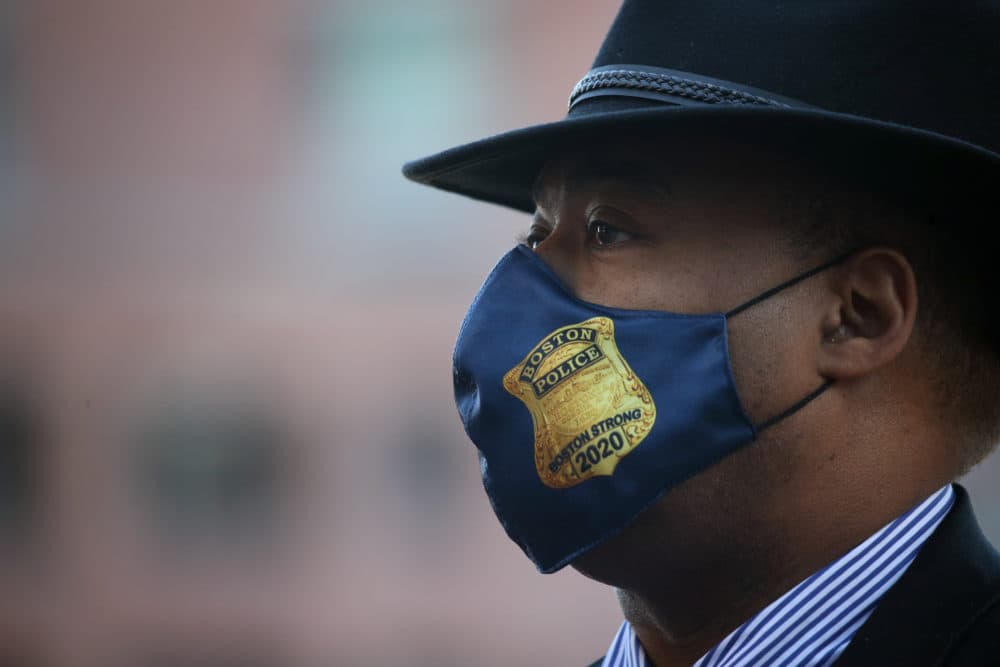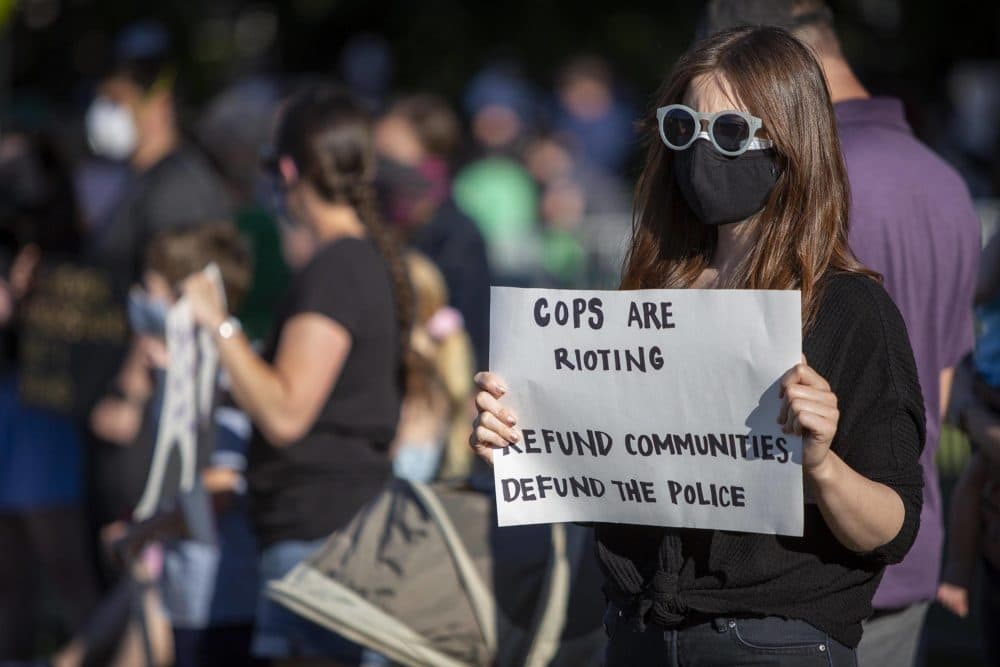Advertisement
Some Boston Police Officers Have Been On Medical Leave For Years, Costing The City Millions

Amid calls to defund police, Boston police officers and their advocates have urged for hundreds more cops to be hired. They say that these days they’re stretched thin, forced to work mandatory overtime and facing a more hostile public.
Nearly 300 officers in Boston are with the department, but they're not working. And the city is spending millions of dollars each year, to pay both the officer at home — who often earns a paycheck tax-free — and the overtime to another cop working to fill that staffing hole.
More than 12% of Boston officers are currently on medical leave, a rate that has increased substantially in the past five years and does not include most COVID-19 cases. An analysis by WBUR finds that more than a quarter of those officers have missed nearly a year or more of work because of illness or injury.
Fifteen police officers on leave today each have spent four or more years off the job.
It’s a problem that’s gotten worse in the last several years, with extended medical leaves spiking even before COVID-19 and new protests that revived the spotlight on police brutality came to Boston this year. More officers are spending longer off the job each year, data show.
Former leaders at the department and outside experts say they’re alarmed and shocked by the numbers. One person calls it “mind boggling.” They acknowledge that the nature of police work creates an inherent struggle to keep officers healthy, but say more can and should be done to lower the number of officers on leave, especially as the state’s injury pay system can incentivize delaying a return to work. Many have called for greater supervision and oversight of the medical leave process.
“The number startles me,” says Chris Fox, who from 2005 to 2010 served as civilian administrator at the Boston Police Department and oversaw personnel.
During his tenure, he recalls about 4% of all officers were on medical leave. “I can’t fathom why 12% of the current workforce is out on disability,” he says.
Those absences create a budget crunch, Fox explains. The city has to pay the officer out on leave, plus overtime for his or her stand-in.
Boston police has not explained why so many officers are out or why the number has ballooned since 2015. Department leaders say they are working to drop today’s total, in part by involuntarily retiring 19 officers.
"The Boston Police Department understands and recognizes the importance of balancing the health needs of our police officers with reasonable standards for returning to work,” Commissioner William Gross said in a statement. “The department relies on the expertise of its medical professionals and in-house doctors who advise on workplace injuries, and evaluate when officers are medically cleared to return to work.”

Gross says the pandemic has brought added challenges that are taxing the department. Still, the department says the number of officers on long-term medical leave does not include most officers who contracted COVID, or those who are on precautionary quarantine.
The department did not make Gross, BPD’s doctors or anyone else with knowledge of the medical leave process available for an interview. The department says it is working to streamline its leave processes, and in July moved to a system in which a case manager is assigned to each officer.
“The number startles me ... I can't fathom why 12% of the current workforce is out on disability."
Chris Fox, former BPD administrator
More Boston officers are on leave than in other cities of similar size — and with busier departments. With about 2,000 officers each, San Francisco and San Diego have just 5.1% and 1.3%, respectively, of their forces on long-term medical leave. Closer to home, of Worcester’s 438 officers, only 4.8% are sick or injured.
FBI crime statistics from last year show Boston has the lowest number of arrests and violent crimes per officer among the four cities.
The number of Boston officers on leave raises questions about their health and safety, but also financial questions, as the department works to cut more than $24 million in overtime costs as outlined in the mayor's budget this year. Almost half of all overtime spending this year has been to replace an absent officer — either someone on medical leave or out for another reason — with a colleague earning time and a half.
"The Boston Police Department is making every effort to maintain the health and safety of officers, while working to reduce the number of officers on medical leave to ensure we are best serving the residents of Boston,” Mayor Marty Walsh said in a statement. “Medical professionals assigned to the Boston Police Department work closely with every injured officer to determine when it is safe for them to return to work."
Walsh didn’t answer questions about how these numbers might affect his commitment to reducing overtime, and did not agree to an interview.
Advertisement
“It's something that we should all be united and concerned about,” City Councilor Kenzie Bok says. “It's concerning for our officer community, from a health and wellness perspective, and it really raises major fiscal issues for the city.”
More Than 100 Officers Were Out For At Least 8 Months Last Year
Policing is widely considered a dangerous job, and officers are put at risk in ways other city employees aren’t. And officers are just as vulnerable to off-the-job illnesses and injuries as anyone else. So it makes sense that some Boston officers would need months or even years to recover.
Daniel Linskey was a BPD officer for 27 years, rising to second in command of the department before retiring in 2014. He says officers’ bodies suffer abuse, and stress, that can exacerbate normal illnesses and injuries.
“Like professional athletes, you know, you get tackled, you get punched, you get kicked ... the body doesn't recover as easily when you're older,” says Linskey, who is now a fellow with Duff & Phelps Institute at Kroll, a risk consulting firm headquartered in New York.
What’s not clear, however, is what’s changed for police in Boston in the last few years and why so many more officers are injured for so much longer.
In three years, the number of officers on leave has jumped roughly 50%, to 216 in January — pre-COVID and before this summer’s round of racial justice protests. It has climbed even further over the next nine months, reaching 270 in September. Officers on COVID quarantine are not included in that figure.
Those numbers are just a snapshot in time. A deeper dive, into city salary data from the last five years, reveals a large chunk of those officers currently out have spent years mostly off the job.
Seventy officers were almost completely off the job during that span — at least 95% of each calendar year, according to WBUR's analysis. Fifteen were out at least that much for more than four years.
The number of officers out for large chunks of the year is also rising. In 2015, 47 police officers spent at least eight months that year on medical leave. Four years later, that figure more than doubled to 107.
The Boston Police Patrolmen’s Association, the department’s largest union, declined to comment for this story. Messages left with the unions that represent detectives and superior officers were not returned.
WBUR attempted to reach the 15 Boston officers who are currently on leave and have been mostly out for four or more years. They did not respond to messages or declined to comment. One of those officers was shot in 2016. Any injuries or illnesses for the other 14 aren’t known to WBUR. The department and the patrolmen’s union both contacted WBUR after these attempts to ask that the station not contact individual officers directly.
A Cost To The City, And Fellow Officers
These numbers have a cost to the city. In dollars, it’s $33 million. That’s how much the city has paid over a five-year period to officers who missed almost an entire calendar year of work at least once. That includes base injury pay but also more than $2.9 million in education incentives given to officers with advanced degrees.
Twenty officers in those five years spent four years or more almost entirely off work. (Five of those officers have since retired or otherwise left the department.) They took home more than $10 million collectively.
But there’s also a cost in terms of officer wear and tear. If an officer is out injured or ill, someone needs to step into his or her beat. And that officer is usually covering some of the work on overtime.
John Violanti, a professor at the University of Buffalo who has studied the negative health impacts of shift work on police, says that creates an unending cycle.
“It’s compounding itself, and we're going to see more and more injuries, I think, as time goes on,” he says. “There's no way to stop that, I think, other than putting more police officers on the job. And unfortunately, that's a block right now. So we are in a bad situation.”

It's Unclear Why So Many Officers Are On Leave
WBUR does not know the conditions that put Boston officers on medical leave, and the department did not disclose them. Published media reports show a handful of incidents that could provide explanations for a few officers: at least four officers were shot; another spent a month in the hospital with COVID-19.
Officers can be out on medical leave for myriad reasons. They might have been injured on the job in a car accident or during a fight with an arrestee. They might have an illness like cancer or heart disease. Or they may have a psychological condition, like post-traumatic stress disorder. With many officers serving in the military before joining the force, they may be more vulnerable to PTSD or anxiety.
Sgt. Eddy Chrispin, a BPD officer for 21 years and president of the Massachusetts Association of Minority Law Enforcement Officers, says he doesn’t know specifically why so many officers are out on medical leave. But he thinks it has something to do with shifts in the public’s views about police.
“People are a lot more combative when dealing with the police, a lot less compliant than they’ve been,” he says. “People will see the police, the mere presence of police in uniform, that'll rise their level of frustration, anger … [that] will rise to the level of the person just being physically combative or non-compliant with handcuffing, et cetera, which leads to more officers getting hurt.”
Linskey wonders how those perspectives might demoralize officers.
“If officers are injured, in the current policing environment, I don't know how many would be in a hurry to come back,” he says.
While the trend of more Boston officers filing for medical leave started before COVID, pandemic-related restrictions could also affect how long people remain on leave. An officer out with a knee injury might not be able to get surgery, because elective surgeries are postponed. Doctors visits and physical therapy appointments might be harder to get. The department’s medical unit has been inundated with tracking COVID exposures this year.
And then there’s the possibility of fraud. Or “malingerers,” as Linskey calls them.
“There are some who would rather take time off and enjoy it,” Linskey says. “And if they can game the system, they will. You know, we used to call them 'Dr. Summeroff' because every time around the summertime, they would go out injured with a reoccurring injury.”
There’s not much the department can do, he says, if a doctor agrees an officer is too injured or sick to work.
“If officers are injured, in the current policing environment, I don't know how many would be in a hurry to come back."
Daniel Linskey, former BPD Superintendent-in-Chief
Linskey contrasts those “summer off” officers with Scott O’Brien, who was shot in the arm and face while searching for a shooting suspect in 2004, and fought to get back to the force. Not everyone is like that, he says.
“There are Scott O’Briens of this world who would do whatever they could do to get back on the job and do a great job every time,” he says. “And there were scam artists, who, quite frankly, infuriated myself and every member of the department."
Whatever the reason, city councilors like Bok want to know what the department’s plan is to address the issue. So far, she says command staff has not given an explanation about the dramatic uptick.
“It’s taking 12% of the force off the force every day,” she says. “And if there were any policing need that was diverting that much of the force, we would be taking a hard look at its necessity and what was going on there.”
Bringing the number of injured or sick officers down to what the city saw even two years ago would be the equivalent of adding 112 more fully trained officers to the force, she explains. Until that’s addressed, Bok says, the city shouldn’t be looking to hire more cops.
What The City Can Do
Former Boston police and city officials WBUR spoke with say this is an issue that’s compounded by state laws giving officers incentive to stay off the job if they’re hurt.
Their pay for an on-duty injury or illness is their full salary, tax free, under state law.
And there are certain medical conditions that, under the law, are presumed to have been suffered in the line of duty for police and firefighters. For police, they include lung and heart conditions, like high blood pressure or heart disease. That widens the pool of what can be considered an on-duty injury or illness beyond acute injuries like a gunshot wound or broken bones.
Officers out on medical leave can’t take lucrative overtime or detail shifts, so there may be that motivation to get back to work. But many officers also purchase supplemental insurance that can pad their injury pay if they’re off the job.
There’s one deadline officers out on leave can get caught up in. Under state law, officers off the job for five or more years have to go back to the academy for retraining.
If an officer remains on leave but doesn’t file for retirement, the city can file for an officer's involuntary retirement, which can take months, especially amid the pandemic. When an officer retires, it opens up a spot on the roster to hire someone new.
Even as the department now moves to retire 19 officers, Linskey says the city usually wants officers to return to their jobs. They’ve invested hundreds of thousands of dollars in training the officer over the years, and a veteran officer has skills that a newly minted academy graduate doesn’t.
So how can the city get officers back to work, or retired and off the books? That’s where greater supervision comes in, former city officials say. Among their suggestions are: Following up weekly with officers who delay getting doctors’ appointments. Not letting cases fall through the cracks. Asking for more documentation. Sending officers to get a second opinion. Constantly reviewing the list of who is out, and who won’t likely be coming back.
That's what Chris Fox remembers the department doing when he oversaw personnel for BPD.
“All we’re doing is doing what managers are supposed to do, supervisors are supposed to do,” he says. “And we just do it on a routine, regular, rigorous basis.”
There’s also work to be done on the front end. To prevent people from going on duty-related injuries in the first place, experts say the department should study the types of injuries and how they occurred. Are officers on overnight shifts getting into a lot of car accidents? Are there certain repetitive injuries that keep showing up? Do officers need more fitness training hours?
Boston can start with looking at what happened just in the last two years, says former Georgia police chief Dwayne Orrick, when the number of officers on long-term leave jumped 70%.
“There may be completely legitimate issues going on. … But what happened there?” asks Orrick, who has studied sick time abuse and is now with the Georgia Association of Chiefs of Police.
Orrick says an event like a protest, or officer arrest, or new police reform legislation can leave officers disengaged and disinterested in continuing being a cop. They may not feel supported, he explains, worrying their lives or jobs are at risk.
“I see other areas of the country where they've had these protests in the last few months where officers just said, 'I quit.' … They walk out the door.”
Until the city takes a hard look at why, experts say, public money will keep going out the door, too.
This segment aired on December 22, 2020.

